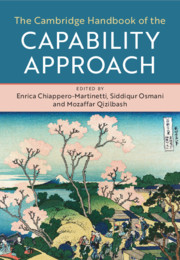Book contents
- The Cambridge Handbook of the Capability Approach
- The Cambridge Handbook of the Capability Approach
- Copyright page
- Dedication
- Contents
- Figures
- Tables
- Contributors
- Foreword
- Acknowledgements
- General Introduction
- Part I Historical Antecedents and Philosophical Debates
- Introduction to Part I
- 1 The Capabilities Approach and the History of Philosophy
- 2 Karl Marx and the Capabilities Approach
- 3 Utility and Capability
- 4 Intellectual History and Defending the Capabilities Approach
- 5 Sen, Smith and the Cambridge Tradition
- 6 The Capability Approach to Well-Being and Freedom from the Viewpoint of Welfare Economics and Social Choice Theory
- 7 Resources or Capabilities?
- 8 Taking Multidimensionality Seriously
- 9 The Capabilities Approach and Political Liberalism
- 10 Selecting a List
- 11 Individualism and the Capability Approach
- 12 The Politics of Wonder
- Part II Methods, Measurement and Empirical Evidence
- Part III Issues in Public Policy
- Index
- References
6 - The Capability Approach to Well-Being and Freedom from the Viewpoint of Welfare Economics and Social Choice Theory
from Part I - Historical Antecedents and Philosophical Debates
Published online by Cambridge University Press: 11 November 2020
- The Cambridge Handbook of the Capability Approach
- The Cambridge Handbook of the Capability Approach
- Copyright page
- Dedication
- Contents
- Figures
- Tables
- Contributors
- Foreword
- Acknowledgements
- General Introduction
- Part I Historical Antecedents and Philosophical Debates
- Introduction to Part I
- 1 The Capabilities Approach and the History of Philosophy
- 2 Karl Marx and the Capabilities Approach
- 3 Utility and Capability
- 4 Intellectual History and Defending the Capabilities Approach
- 5 Sen, Smith and the Cambridge Tradition
- 6 The Capability Approach to Well-Being and Freedom from the Viewpoint of Welfare Economics and Social Choice Theory
- 7 Resources or Capabilities?
- 8 Taking Multidimensionality Seriously
- 9 The Capabilities Approach and Political Liberalism
- 10 Selecting a List
- 11 Individualism and the Capability Approach
- 12 The Politics of Wonder
- Part II Methods, Measurement and Empirical Evidence
- Part III Issues in Public Policy
- Index
- References
Summary
Traditionally, the state of persons has been described either by means of how richly they are endowed with means for achieving their ends, or by means of how happy or fulfilled they are. Sen criticized the former, opulence-focused approach for its commodity-fetishist bias; he also criticized the latter, utility-focusedapproach for the reason that considerations of feasibility enter into what we are pained not to obtain, and what we can expect to obtain may involve compromises with a harsh reality. Sen’s capability approach was introduced so as to be free from these defects in the informational bases of normative economics. This chapter is meant to highlight the crucial features of this approach. We contend that it is an attempt to build a coherent framework of the realization-focused assessment approach to human well-being, freedom and equality. It is concerned not with the characterization and implementation of the first-best allocation of resources, but with the identification of the channels through which the suboptimal allocation of resources can be improved without violating freedom and dignity of persons. It is founded on the non-consequentialinformational basis, as it assigns a crucial role to the intrinsicvalue of the freedom of choice within each person’s capability.
Keywords
- Type
- Chapter
- Information
- The Cambridge Handbook of the Capability Approach , pp. 106 - 125Publisher: Cambridge University PressPrint publication year: 2020

